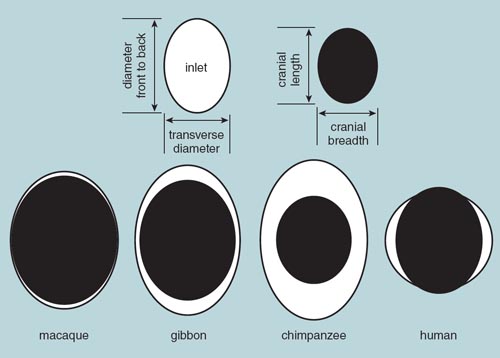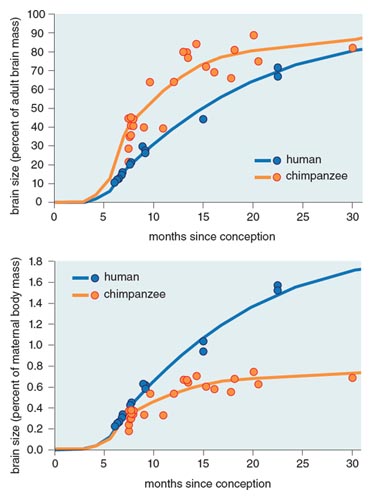Why Is Human Childbirth So Painful?
By Pat Lee Shipman
Having babies isn’t easy—and the standard explanation may be wrong.
Having babies isn’t easy—and the standard explanation may be wrong.

DOI: 10.1511/2013.105.426
Humans are funny mammals. Among other things, we walk oddly (on two legs) and we have curiously big brains. We bear large babies with active and highly developed brains but with pitifully inept bodies. Despite what would seem evolutionarily unfavorable, one in 1,000 human mothers have a baby whose head is too big to fit through the birth canal, which necessitates a cesarean section, if medical care is available. Virtually all human mothers experience pain in childbirth, and delivery takes much longer than in other mammals. For example, in University of New Mexico researcher Leah Albers’s 1999 study of 2,500 full-term births, labor lasted on average almost nine hours for first-time mothers. In comparison, apes and monkeys generally give birth within two hours. Cross-culturally, assistance in childbirth is almost universal. Although evolution ought to favor low-risk, easy deliveries, this is not how it turned out for humans. To understand why, we need to consider advantages and disadvantages of more developed newborns, wider hips in the mother, and the metabolic demands on the mother.

Photo at top, Mauro Fermariello/Science Source; at middle, Ocean/Corbis; at bottom, Organics image library/Alamy
Human newborns are unique among mammals in that, unlike other singly borne offspring, our babies cannot immediately get up, feed, and walk around like a newborn foal; yet our newborns’ brains are much more active than those of a litter of helpless newborn pups with their eyes still closed and their ears unable to hear. Thus, in comparison to other animals born one at a time, human babies are born at an earlier developmental stage, before their bodies have developed enough to walk around.
This strange mélange of two basic adaptive strategies—an active brain with an inept body—is widely thought to have evolved because our unusually large brains and our peculiar, bipedal mode of getting around produce conflicting demands. This explanation is called the obstetrical dilemma. In humans, the size of the head of term fetuses is a tight fit for the mother’s bony birth canal. According to the obstetrical hypothesis, we need a wide pelvis to bear big-brained babies but a narrow one to walk or run efficiently. The compromise between these opposing needs is to carry babies as long as possible so that the brain can grow in utero and then—just before the baby’s head gets too big to fit through the birth canal—deliver the infant earlier relative to when other mammals deliver theirs.
The work of reproduction isn’t finished then. For the first year after birth, human babies continue to develop rapidly at a fetal rate in both brain size and body maturity—a risky strategy that calls for a great deal of investment by the mother. Not only must she grow the baby inside her womb for 9 months, but also she must continue to care for and protect the helpless infant for another 12 months after birth. She also continues to nourish the baby with breast milk, if we ignore the relatively recent invention of formula or other substitutes. To grow into big-brained adults, our mothers have to give us a great deal of care and feeding. Of course, fathers make genetic contributions to the baby and can ease the mother’s task substantially if they provide for or protect the mother of their offspring.
As Robert Martin quips in his new book, How We Do It, “We get our brains from our mothers,” genetic contributions from the father notwithstanding. What mothers do for their babies is meet their enormous metabolic needs, enabling baby brains to grow big before and immediately after birth.
The prolonged period of breastfeeding needed by a human baby is the most energetically demanding period of a female’s life. A mother may even allocate her own brain during pregnancy, losing some 4 percent of its volume, to meet the energetic demands of her baby’s brain. (The loss is regained, fortunately, in about six months.) Some have speculated that the reason female mammals are often much smaller in body size than males is so that the lifetime energetic needs of a female, who experiences metabolically demanding pregnancy and lactation, will equal those of a male.
The obstetrical hypothesis postulates that the demands of an unusual locomotor system increase the risk and cost of the reproductive process. If this is the case, evolution would favor human birth at earlier stages of development than in other, nonbipedal primates, and mothers with wider hips would experience decreased motor efficiency.

Illustration by Tom Dunne.
The obstetrical hypothesis is neat and readily comprehended, which helps explain its widespread acceptance, but new evidence casts doubt on it. A recent paper by Holly Dunsworth of the University of Rhode Island and colleagues reexamines the predictions and evidence supporting the obstetrical hypothesis and suggests an alternative explanation. For instance, human gestation is often said to be short relative to that of other primates, based on how much more growth is needed in neonates to achieve adult brain size. The shorter duration of gestation on first glance supports a prediction of the obstetrical hypothesis—that birth has evolved to occur earlier in hominids so that the baby is born before its head is too large to pass through the birth canal. Actually, the duration of human pregnancy (38–40 weeks) is absolutely longer than that of chimps, gorillas, and orangutans (32 weeks for chimps and 37–38 weeks for the latter two). When Dunsworth and her colleagues took maternal body size into account, which in primates is positively correlated with gestation length, they showed that human pregnancy is also relatively longer compared to that in great apes. No wonder that the third trimester seems so long to many pregnant women.
Another oft-cited fact supporting the obstetrical hypothesis is that, of all the primates, human newborns have the least-developed brains. Human babies’ brains are only 30 percent of adult size, as opposed to 40 percent in chimps. This difference in newborn brain size seems to suggest that human babies are born at an earlier developmental stage than other primates.

Image adapted by Tom Dunne from K. Rosenberg and W. Trevathan, BJOG: An International Journal of Obstetrics and Gynaecology 109:1199.
The catch is that adult brain size in humans is much larger than in other primates for reasons having nothing to do with birth. This means that using adult brain size as a basis for comparing relative gestation length or newborn brain size among primates will underestimate human development. But as one of the collaborators with Dunsworth, Peter Ellison of Harvard University, pointed out in his 2001 book Fertile Ground, the relevant question is, Given how large a mother’s body size is, how big a brain can she afford to grow in her baby? It is an issue of supply and demand. Labor occurs when the mother can no longer continue to supply the baby’s nutritional and metabolic demands.
As Ellison puts it, “Birth occurs when the fetus starts to starve.” From this perspective, the brain size of a human newborn is not small for a primate but is very large—one standard deviation above the mean. Body size in human newborns is also large relative to other primates when standardized for a mother’s body size. Both facts suggest that pregnancy may push human mothers to their metabolic limits.
The obstetrical hypothesis, in contrast, suggests that locomotion rather than metabolism is the limiting factor in birth size. The underlying concept here is that wider-hipped women—capable of giving birth to larger offspring—should suffer a disadvantage in locomotion. But detailed studies of the cost of running and walking—including new work by Dunsworth’s coauthors Anna G. Warrener of Harvard University and Herman Pontzer of Hunter College—do not support this idea. Men and women are extremely similar in the cost and efficiency of locomotion, regardless of hip width. Enlarging the birth canal to pass a baby with a brain 40 percent of adult size, as is typical of newborn chimps, would require an increase in diameter of only three centimeters—just over an inch—in the smallest dimension of the birth canal. This wouldn’t hinder locomotion significantly, given that many women already have such broad hips. The conflict between big-brained babies and upright walking may be more conceptual than real.
Although the findings showing that human babies are not earlier than other primates are interesting, they still fail to identify what limits baby brain size. Dunsworth and her coauthors propose that the metabolic constraints faced by a mother limit the length of pregnancy and fetal growth. They have dubbed their hypothesis the energetics-of-gestation-and-growth hypothesis.

Graphs adapted by Barbara Aulicino from H. Dunsworth, et al., Proceedings of the National Academy of Sciences of the U.S.A. 109:15212.
As the baby grows in both brain and body in the womb, its demand for energy accelerates exponentially. At some point, the mother reaches the limit of her ability to supply the fetus’s demands, and then labor begins. Even following birth, the big-brained, big-bodied newborn needs a loving mother who will continue to feed and care for it while its brain continues to grow at a fetal rate. In the womb, the fetus is basically part of the mother. Once born, the baby is effectively at a higher trophic level than its mother, like a parasite feeding on her, which increases the metabolic demands on her. However, the baby’s needs have shifted to include more long-chain fatty acids, which are key for brain growth. Since these are very efficiently transmitted to the baby through breast milk, rather than through the placenta, moving the baby outside the womb isn’t a problem.
The obstetrical hypothesis is not defunct; it is simply under question. But merely convincing those who were raised intellectually within this paradigm to consider an alternative hypothesis can be challenging. When she gives a talk about the energetics hypothesis, Dunsworth summarizes a conversation that illustrates this challenge:
What always comes next is, “then why doesn’t the pelvis get wider to make childbirth easier?” And my answer is always, “Because it’s good enough. Witness over seven billion humans on the planet.” But that doesn’t satisfy most people who are moved to ask the question in the first place. And when they argue “the tight fit at birth is too much of a coincidence to ignore,” I ask, “Isn’t it just a coincidence that my finger fits perfectly into my nostril?”
She’s right. Evolutionary adaptation doesn’t have to be perfect, just good enough. Perhaps the female pelvis adapted to fit the size of the human fetus’s brain, rather than the female pelvis’s limiting the baby’s brain size. Still, we are left with no clear reason why a baby is such a tight fit in the mother’s birth canal. Pelvic size may be limited by something not yet taken into account in locomotor studies, such as speed, balance, or risk of injury. Or, perhaps simple economy keeps pelvic size close to neonatal brain size. The third alternative is that human childbirth was not always difficult and has only become so as improvements in diet have increased newborn body size. The obstetrical hypothesis and the energetics hypothesis are not mutually exclusive.
The evolutionary conflict that makes human birthing difficult may not be between walking or running and having babies, but between the fetus’s metabolic needs and the mother’s ability to meet them. Perhaps the problem isn’t only having —bearing—a big-brained baby. Perhaps the real problem is making one.
Click "American Scientist" to access home page
American Scientist Comments and Discussion
To discuss our articles or comment on them, please share them and tag American Scientist on social media platforms. Here are links to our profiles on Twitter, Facebook, and LinkedIn.
If we re-share your post, we will moderate comments/discussion following our comments policy.